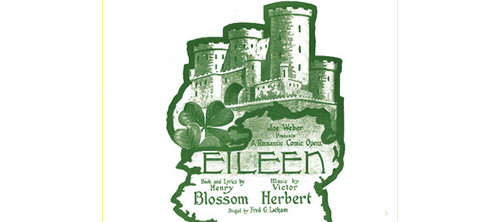Eileen
Musical (1917)
Inspiration biographique

Bien que certainement pas aussi populaire que ses opérettes "Babes dans Toyland" (1903), "Mlle. Modiste" (1905), "The Red Mill "(1906), "Naughty Marietta", et "Sweethearts", "Eileen" de Victor Herbert est peut-être son oeuvre la plus sincère et personnelle, et une qui contient beaucoup de ses meilleures chansons (y compris « Thine Alone », « Eileen, Alanna, Asthore » et « The Irish Have a Great Day Tonight »). Rappelons qu'Herbert était né à Dublin, et son opérette traite de la lutte apparemment éternelle menée par les Irlandais pour leur indépendance de l’Angleterre.
Après deux représentations à Cleveland au Colonial Theatre, les 1er et 2 janvier 1917, sous le titre "Hearts of Erin", le musical a déménagé à Boston et changé son titre en "Eileen". Il a ensuite ouvert ses portes au Shubert Theatre le 19 mars 1917 et n’a donné que 64 représentations. Il a été produit par Joe Weber, anciennement du duo comique Weber et Fields. Il a ensuite tourné, mais un incendie a détruit ses décors et ses costumes trois mois après le début de la tournée. Le spectacle n'a été repris à New York qu’à la fin du XXe siècle. En 1982, E. G. Marshall, O’Day, Judy Kaye, Lady Maude et Roderick Cook, Sir Reginald, ont donné un concert unique à l’hôtel de ville de Manhattan. En 1997, il a été produit et enregistré par le Ohio Light Opera. En 2012, une petite production a été donnée par le Light Opera de New York.
Situé en 1798, l’histoire suit un révolutionnaire irlandais arrêté par les Britanniques pour trahison. Eileen, sa noble chérie, l’aide à s’échapper en le déguisant en serviteur.
Afficher le synopsis détaillé
Acte I
It is 1798, the year of the brutal uprisings of the United Irishmen, who seek to reclaim their lands from the British. Lady Maude, the attractive widow of Lord Estabrook, an English lady, is the mistress of Castle Sligo, once held by the O'Day family, creating resentment among the Irish locals. Her niece, Eileen, has returned to Ireland after schooling at a convent in France; she is accompanied by the bumbling Sir Reginald. Shaun Dhu leads a band of smugglers and revolutionaries on the Western coast of Ireland that includes Barry O'Day, son of a legendary Irish rebel. The band stores its loot at Biddy's Black Bull Inn in an effort to avoid nasty British tax collector Humpy Grogan. Lady Maude and Eileen stop at the Inn when their carriage breaks down. Barry protects them from some village drunks and flirts with Maude, although it is really Eileen who has caught his eye; Maude is sympathetic to the rebels' cause. Colonel Lester, the local British authority, comes to arrest Barry for treason, but Lady Maude keeps the Colonel at bay, and Barry escapes disguised as Lady Maude's groom.
Acte II
Later, at Castle Sligo, Lady Maude has developed affection for Barry. Eileen explains that Barry is a rogue. Nevertheless, Maude decides to help Barry escape again from the Colonel by putting a coachman's uniform on her guest, Sir Reggie, making him a decoy. Sir Reggie is arrested and sentenced to death before the Colonel learns that he has been fooled and that Barry has gotten away again.
Acte III
By the time of Lady Maude's birthday, Eileen and Barry have fallen in love. Learning that Barry is there, the Colonel has his men surround the castle. Barry surrenders, and he is about to be shot, when news arrives that the King has pardoned the rebels. The arrest is reversed, various couples are united, including Barry and Eileen, and it is declared that "Ireland shall stand among all nations of the world."
Herbert was eager to write an "Irish" musical to celebrate the land of his birth. His score was well received by the critics, but the libretto received some harsh reviews. Alexander Woollcott wrote: "Mr Blossom [must have] gathered his material and atmosphere by reading for quite half an hour in some public library."
Herbert était désireux d’écrire un musical "irlandaise" pour célébrer la terre de sa naissance. Sa partition a été bien accueillie par les critiques, mais le livret a lui reçu quelques critiques sévères. Alexander Woollcott a écrit : "Mr Blossom [doit avoir] s'être documenté sur l'Irlande en lisant pendant une demi-heure dans une bibliothèque publique."
1 Eileen s'intéresse à un personnage historique important: .
Acte I
Free Trade and a Misty Moon – Shaun Dhu and Smuggler Chorus
My Little Irish Rose – Rosie Flynn
Ireland, My Sireland – Captain Barry O'Day
Glad, Triumphant Hour – Barry O'Day and Chorus
Acte II
Too-re-loo-re – Eileen and Chorus
Eileen, Alanna Asthore – Barry O'Day
If Eve Had Left the Apple on the Bough – Sir "Reggie"
I'd Love to be a Lady – Dinny Doyle and Rosie
When Love Awakes! – Eileen and Girls
Life's a Game at Best – Lady Maude and Colonel Lester
Finale – Ensemble
Acte III
In Erin's Isle – Lady Maude and Ensemble
Thine Alone – Eileen and Barry O'Day
The Irish Have a Great Day Tonight – Dinny and Men
When Ireland Stands Among the Nations of the World – Barry O'Day and Ensemble
Eileen Mulvaney, niece of Lady Maude (soprano) – Grace Breen
Captain Barry O'Day, a fine Irish Rebel (tenor) – Walter Scanlan
Lady Maude Estabrooke, Eileen's Aunt – Olga Roller
Colonel Lester, the local British authority – Edward Martindel
Shaun Dhu, Barry's steadfast mate – Greek Evans
Sir Reginald Stribling, a British Knight – Algernon Grieg
Rosie Flynn – Louise Allen
Biddy Flynn – F. Josie Claflin
"Humpy" Grogan, the British tax collector – John B. Cooke
Lanty Hackett – Harry Crosby
Mickey O'Brien – Joseph Dillon
Dinny Doyle – Scott Welsh
Chorus of Villagers
Aucun dossier informatif complémentaire concernant Eileen
Aucun dossier informatif complémentaire concernant Eileen
Pas encore de video disponible pour ce spectacle